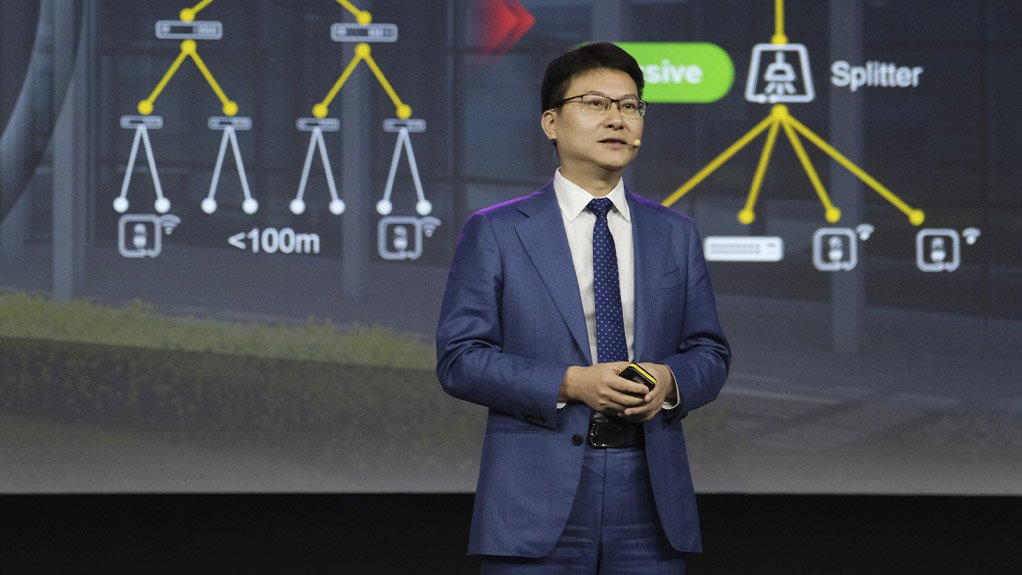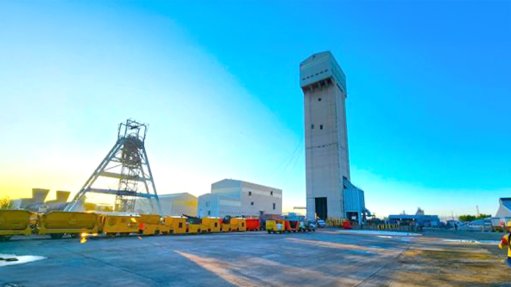Huawei’s Bob Chen discusses three optical business trends driving industrial intelligence


Bob Chen, President of Huawei Optical Business Product Line, delivering a keynote speech
Bob Chen, President of Huawei’s Optical Business Product Line, delivered a keynote speech titled "three trends in Optical Business, promoting industrial intelligence," at the recently concluded Huawei Africa Connect 2024. His speech also assessed the huge optical industry opportunities in Sub-Saharan Africa encompassed in these trends: "Fibre-in Copper-out", "fgOTN-in SDH-out", and "Optical-sensing-in Hard-work-out" —to build all-optical everywhere for an intelligent world.
Chen said, "Throughout history, every technological revolution changes human production and life significantly. The past three revolutions have made production evolve from mechanisation to automation. Now, an industrial revolution driven by AI is taking place, bringing new value to various sectors. Industrial intelligence poses higher requirements on data transmission and sensing, driving the three key trends in optical business."
Fibre in copper out: home broadband evolution to E2E all-optical networks that ensure better experiences and build green, ultra-broadband, and simplified campus networks.
"Fibre-in copper-out" is not a new topic,” said Chen. More than a decade ago, operators started replacing copper networks with optical networks, and the number of global fibre to the home, or FTTH users now exceeds 900 million. Now, "fibre-in copper-out" in households is moving further towards fibre to the room (FTTR), and providing users with better Wi-Fi experiences.
In the upcoming intelligent era, ISPs need to build all-optical access networks for households and small and micro enterprises. They also need to extend ultimate broadband experiences to every room through FTTR. This is necessary to achieve ubiquitous Gbps or even 10 Gbps bandwidth experiences. Furthermore, ISPs need to move 100G OTN and OXC all-optical switching downwards to network edges to achieve the low latency bearing of integrated services. They also need to eliminate bandwidth bottlenecks and address the rapid growth of broadband traffic and intelligent applications, by building 400G ultra-high-speed backbone networks with the 3D-mesh architecture.
"Fibre-in copper-out is also moving to campuses,” said Chen. In the 10 Gbps campus era, Wi-Fi 7 is indispensable. It supports high-bandwidth wireless access from 3 to 18 Gbps. But this means that existing copper cables in most campuses must be replaced with optical fibre because copper cannot support such high speeds. Optical fibre has a 30-year service lifespan, support 100 Tbps bandwidth, and unlimited distance in campuses. All this makes optical fibre the best choice for building campus networks.
Compared with traditional technologies, the fibre to the office (FTTO) solution only requires devices in the CO equipment room and terminals, and uses passive optical splitters to replace active devices. Chen said, “This reduces cabling costs by 80%, lowers O&M workload by 50%, and decreases power consumption by 30%. In addition, fibre deployment is a one-time operation with a lifespan of 30 years.”
Huawei has launched a next-generation FTTO 2.0 solution, in which XGS-PON Pro and Wi-Fi 7 technologies are used to upgrade bandwidth, networking, and O&M.
FgOTN in SDH out: the SDH-to-fgOTN evolution of industry production communication networks is inevitable
SDH has been used to ensure production security in various industries for more than 30 years. As industries move toward digital and intelligent upgrades, traditional SDH technology faces challenges regarding insufficient bandwidth and legacy devices. In response, the International Telecommunication Union’s Telecommunication Standardisation Sector (ITU-T) released the fgOTN standard at the end of 2023 and defined it as the next-generation technology to replace SDH. For constant bit rate (CBR) services such as teleprotection, fgOTN is the only transmission technology that has international standards in addition to SDH.
Huawei launched the industry's first optical transmission product series that supports the fgOTN standard, Huawei OptiXtrans E6600. It features 99.9999% availability, smooth evolution, high flexibility, and high efficiency, meeting the requirements of production communication networks in industries such as electric power and transportation.
Optical sensing in, hard work out: how multi-dimensional sensing and AI make work more comfortable and efficient
Many industry scenarios, such as oil and gas pipeline inspection as well as perimeter inspection, still require manual onsite operations. In addition to repetitive outdoor work, these operations can expose employees to health and safety issues in bad weather conditions.
In the intelligent era, optical fibre, vision, and radar can sense information from multiple dimensions. Moreover, AI can be used for more intelligent remote operations, enabling employees to move from outdoor sites to offices. This creates a more comfortable working environment and improves employee productivity.
Huawei has developed a multi-dimensional sensing convergence solution for video and optical fibre sensing. In perimeter inspection scenarios, Huawei's optical-visual linkage perimeter inspection solution integrates optical fibre and video sensing for optimal judgment, achieving zero false negatives.
In addition, Huawei uses an industry-leading optical signal digital processing (oDSP) module and unique AI foundation model for training and inference, achieving 90% fewer false positives than the industry average. Even in extreme weather conditions with near gale force winds and heavy rain, it is possible to ensure high precision.
At the end of his speech, Chen stressed that time and tide wait for no one and that a new era of intelligence is upon us. Huawei is looking forward to working with customers and industry partners in Sub-Saharan Africa to seize historical opportunities brought by three trends in optical business, achieving all-optical everywhere for an intelligent world.
Article Enquiry
Email Article
Save Article
Feedback
To advertise email advertising@creamermedia.co.za or click here
Comments
Press Office
Announcements
What's On
Subscribe to improve your user experience...
Option 1 (equivalent of R125 a month):
Receive a weekly copy of Creamer Media's Engineering News & Mining Weekly magazine
(print copy for those in South Africa and e-magazine for those outside of South Africa)
Receive daily email newsletters
Access to full search results
Access archive of magazine back copies
Access to Projects in Progress
Access to ONE Research Report of your choice in PDF format
Option 2 (equivalent of R375 a month):
All benefits from Option 1
PLUS
Access to Creamer Media's Research Channel Africa for ALL Research Reports, in PDF format, on various industrial and mining sectors
including Electricity; Water; Energy Transition; Hydrogen; Roads, Rail and Ports; Coal; Gold; Platinum; Battery Metals; etc.
Already a subscriber?
Forgotten your password?
Receive weekly copy of Creamer Media's Engineering News & Mining Weekly magazine (print copy for those in South Africa and e-magazine for those outside of South Africa)
➕
Recieve daily email newsletters
➕
Access to full search results
➕
Access archive of magazine back copies
➕
Access to Projects in Progress
➕
Access to ONE Research Report of your choice in PDF format
RESEARCH CHANNEL AFRICA
R4500 (equivalent of R375 a month)
SUBSCRIBEAll benefits from Option 1
➕
Access to Creamer Media's Research Channel Africa for ALL Research Reports on various industrial and mining sectors, in PDF format, including on:
Electricity
➕
Water
➕
Energy Transition
➕
Hydrogen
➕
Roads, Rail and Ports
➕
Coal
➕
Gold
➕
Platinum
➕
Battery Metals
➕
etc.
Receive all benefits from Option 1 or Option 2 delivered to numerous people at your company
➕
Multiple User names and Passwords for simultaneous log-ins
➕
Intranet integration access to all in your organisation



















